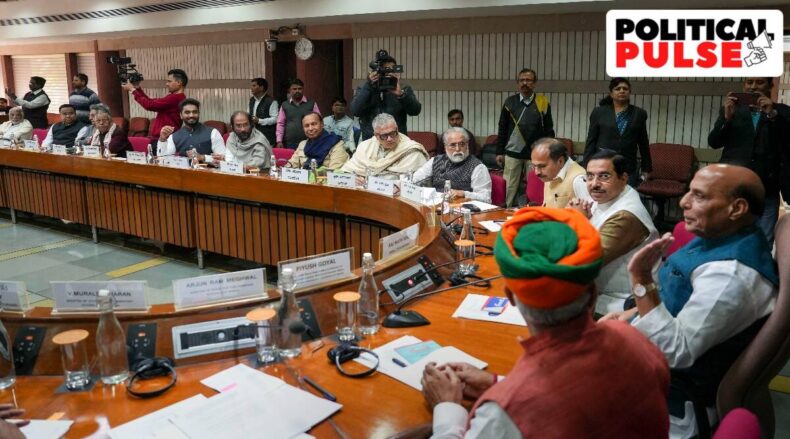New Delhi, India 7th DEC – Beginning on Wednesday, the 3-week, Winter Session of Parliament will get ongoing. The government has prepared 16 new Bills for consideration and passage, and the opposition has identified many issues, including the alleged abuse of investigation agencies
There would be 25 bills on the government’s legislative agenda, including two finance bills, seven pending bills, and 16 new bills. Tuesday, senior ministers, including Defence Minister Rajnath Singh, met with floor leaders from different political parties to solicit their support for the efficient operation of the House. The gathering of all parties was not attended by Prime Minister Narendra Modi. The leaders of the opposition parties urged the government to give the opposition parties’ voices a chance to be heard in Parliament.
Some of the leaders informed Singh, Piyush Goyal, the Leader of the House in the Rajya Sabha, Pralhad Joshi, and Arjun Ram Meghwal, the Minister of State for Parliamentary Affairs, that the customary pre-session all-party meetings have turned purely ceremonial because the government hasn’t acted on its promises to permit discussions.
According to sources, at the all-party meeting, the Congress, Trinamool Congress, AAP, and NCP demanded that the misuse of investigation agencies like the CBI and ED be discussed. The Congress sought discussions on several issues, but the party will primarily focus on three issues: the Chinese incursions at the border, price rise and unemployment, and the attack on independent institutions. The Congress was represented by its Lok Sabha leader Adhir Rajnan Chowdhury and chief whip, in the Rajya Sabha Syed Naseer Hussain.

The Congress is eager to compel the administration to hold a meeting to discuss the “breakdown of independent bodies” to discuss matters such as the administration’s disagreements with the higher judiciary, its rejection of the recommendations of the Supreme Court Collegium, and the controversy surrounding the appointment of the Chief Election Commissioner after the Supreme Court questioned the speed with which Election Commissioner Arun Goel was chosen. In light of the Supreme Court ruling, Hussain claimed that Congress mandated discussions on the appointment of the Election Commissioner in just one day as well as the quota for the Economically Weaker Section.
The “economic embargo of states,” “attempts to affect appointed state governments” like West Bengal, and the abuse of investigation agencies for “political vengeance against Opposition parties,” according to the Trinamool Congress, were all topics that needed discussion in addition to price increases and unemployment. Derek O’Brien, the TMC floor leader, argued that the government needs to permit at least one short-term debate and one Calling Attention notice each week. There will be 17 sittings during the 23-day session, which starts on Wednesday and closes on 29th, December.

It is unlikely that Rahul Gandhi and other prominent Congressmen who are participating in the Bharat Jodo Yatra will attend the meeting. Joshi provided specifics about the government’s legislative agenda for the session at the all-party meeting and enlisted the opposition’s help in getting bills passed. After the meeting, Congress leader Chowdhury told reporters that there are “several issues facing the country, such as unemployment and price rise, and the government owes an answer to the people.”
He claimed that the Opposition was not “appropriately” informed by the government about the standoff at the Sino-Indian border. We will demand a discussion about it and the murder of Kashmiri Pandits in the House, he said. The Shinde faction of the Shiv Sena sought a population control Bill, while the BJD demanded passage of the women’s reservation Bill. Sanjay Singh, the leader of the AAP, called for a debate on the Old Pension Scheme (OPS) and legislation guaranteeing the Minimum Support Price (MSP) for agricultural products.
Opposition members questioned the government’s plan to pass about 25 Bills in 17 sittings. Three bills that Congress believes cannot be passed in their current form have already received clear indications that it will oppose them. The party will ask for the referral of the Forest Conservation Amendment Bill and the Multi-state Cooperative Societies Amendment Bill to standing committees. Even though a Joint Committee of Parliament has already reviewed the Biological Diversity Amendment Bill, the party thinks there are many problematic provisions in the Bill.














